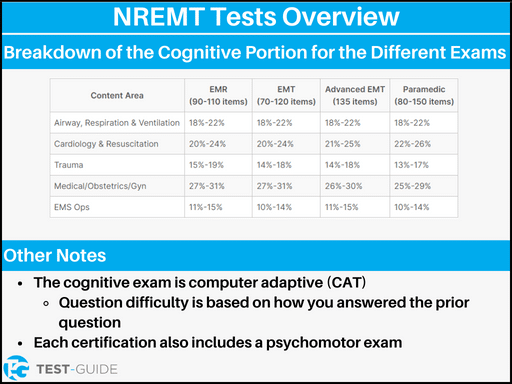The National Registry of Emergency Medical Technicians (NREMT) offers different certifications. Each certification exam is slightly different.
Each test consists of:
- Cognitive Exam: Multiple-choice questions
- Psychomotor Exam: Hands-on skills tested in front of an instructor.
Preparing for an exam? Use one of the following practice exams to help prepare:

Emergency Medical Responder Exam Overview (EMR)
Cognitive Portion
- Total Questions: 90 to 110 Multiple-Choice Questions
- Time Limit: 1 Hour 45 Minutes
| Subject | Percent of Exam | Adult/Pediatric Mix |
|---|---|---|
| Airway, Respiration & Ventilation | 18% – 22% | 85% Adult; 15% Pediatric |
| Cardiology & Resuscitation | 20% – 24% | 85% Adult; 15% Pediatric |
| Trauma | 15% – 19% | 85% Adult; 15% Pediatric |
| Medical; Obstetrics & Gynecology | 27% – 31% | 85% Adult; 15% Pediatric |
| EMS Operations | 11% – 15% | N/A |
Psychomotor Portion
The Psychomotor exam is administered by individual states (instead of the NREMT on a national level). The test is usually administered by the state’s emergency management services offices or a local training institution.
You will be asked to perform various emergency skills in a hands-on environment.
The scores and skills tested on this portion of the exam will vary on a state-by-state basis, so it is best to check with your state for specifics.
Emergency Medical Technician Exam Overview (EMT)
Cognitive Portion
Total Questions: 70 to 120 Multiple-Choice Questions
Time Limit: 2 Hours
| Subject | Percent of Exam | Adult/Pediatric Mix |
|---|---|---|
| Airway, Respiration & Ventilation | 18% – 22% | 85% Adult; 15% Pediatric |
| Cardiology & Resuscitation | 20% – 24% | 85% Adult; 15% Pediatric |
| Trauma | 14% – 18% | 85% Adult; 15% Pediatric |
| Medical; Obstetrics & Gynecology | 27% – 31% | 85% Adult; 15% Pediatric |
| EMS Operations | 10% – 14% | N/A |
Psychomotor Portion
The Psychomotor exam is administered by individual states (instead of the NREMT on a national level). The test is usually administered by the state’s emergency management services offices or a local training institution.
You will be asked to perform various emergency skills in a hands-on environment.
The scores and skills tested on this portion of the exam will vary on a state-by-state basis, so it is best to check with your state for specifics.
Take an EMT practice test to prepare for your exam.
Advanced Emergency Medical Technician Exam Overview (AEMT)
Cognitive Portion
Total Questions: 135 Multiple-Choice Questions
Time Limit: 2 hours 15 Minutes
| Subject | Percent of Exam | Adult/Pediatric Mix |
|---|---|---|
| Airway, Respiration & Ventilation | 18% – 22% | 85% Adult; 15% Pediatric |
| Cardiology & Resuscitation | 21% – 25% | 85% Adult; 15% Pediatric |
| Trauma | 14% – 18% | 85% Adult; 15% Pediatric |
| Medical; Obstetrics & Gynecology | 26% – 30% | 85% Adult; 15% Pediatric |
| EMS Operations | 11% – 15% | N/A |
Psychomotor Portion
The Psychomotor exam is administered by individual states (instead of the NREMT on a national level). The test is usually administered by the state’s emergency management services offices or a local training institution.
You will be asked to perform various emergency skills in a hands-on environment like:
- Patient Assessment – Trauma and Medical
- IV and Medical Skills
- Ventilatory Management
- AED/Cardiac Arrest Management
- Random EMT Skills
The scores and skills tested on this portion of the exam will vary on a state-by-state basis, so it is best to check with your state for specifics.
Paramedic Exam Overview
Cognitive Portion
Total Questions: 80 to 150 Multiple-Choice Questions
Time Limit: 2 hours 30 Minutes
| Subject | Percent of Exam | Adult/Pediatric Mix |
|---|---|---|
| Airway, Respiration & Ventilation | 18% – 22% | 85% Adult; 15% Pediatric |
| Cardiology & Resuscitation | 22% – 26% | 85% Adult; 15% Pediatric |
| Trauma | 13% – 17% | 85% Adult; 15% Pediatric |
| Medical; Obstetrics & Gynecology | 25% – 29% | 85% Adult; 15% Pediatric |
| EMS Operations | 10% – 14% | N/A |
Psychomotor Portion
The Psychomotor exam is administered by individual states (instead of the NREMT on a national level). The test is usually administered by the state’s emergency management services offices or a local training institution.
You will be asked to perform various emergency skills in a hands-on environment like:
- Patient Assessment – Trauma
- Dynamic and Static Cardiology
- Oral Station Cases A and B
- Out-of-Hospital Scenarios
The scores and skills tested on this portion of the exam will vary on a state-by-state basis, so it is best to check with your state for specifics. Licensing requirements for paramedics also vary by state. You can check with your local EMS agency for these requirements.
Take a paramedic practice test to prepare for your exam.
Frequently Asked Questions
What is on the EMT test?
A different test is given depending on which certification you are going for. However, all of the tests consist of a cognitive exam (multiple-choice questions) and a psychomotor exam (hands-on skills assessment).
All of the exams also test candidates on the same 5 subjects:
- Airway, Respiration & Ventilation
- Cardiology & Resuscitation
- Trauma
- Medical; Obstetrics & Gynecology
- EMS Operations
Are the EMT exams hard?
The exams will require you to put in some study hours to do well. The cognitive portion will consist of multiple-choice questions, while the psychomotor test will be hands-on and “field training.”
The cognitive portion of the exam is a Computer Adaptive Test (CAT), so it will feel hard. Computer adaptive means that the test adjusts to how you are answering questions. If you answer a question right, you will most likely see a more challenging question next.
Can I retake the EMT exams?
Yes, candidates are given three attempts to pass the cognitive exam. You must wait at least 15 days after each failed attempt before taking the exam another time.
If you cannot pass the exam for the third time, you must take a remedial training program and show evidence of successful completion before you can retake the exam.
Candidates are allowed two full attempts to pass the psychomotor exam. If candidates do not pass on the second attempt, remedial training will be required.
Do I have to take both the cognitive and psychomotor exams?
Yes, you will need to take and pass both the cognitive and psychomotor exams. All four of the certifications include both exams.
What does computer adaptive testing mean?
Computer adaptive testing is used for the cognitive exams. Computer adaptive testing means that the questions “adapt” their difficulty based on how you answered the previous question.
Since the exam is constantly adapting to how you are doing, not everyone will see the same number of questions. Some individuals may only see 80 questions, while others may see 100 questions.

